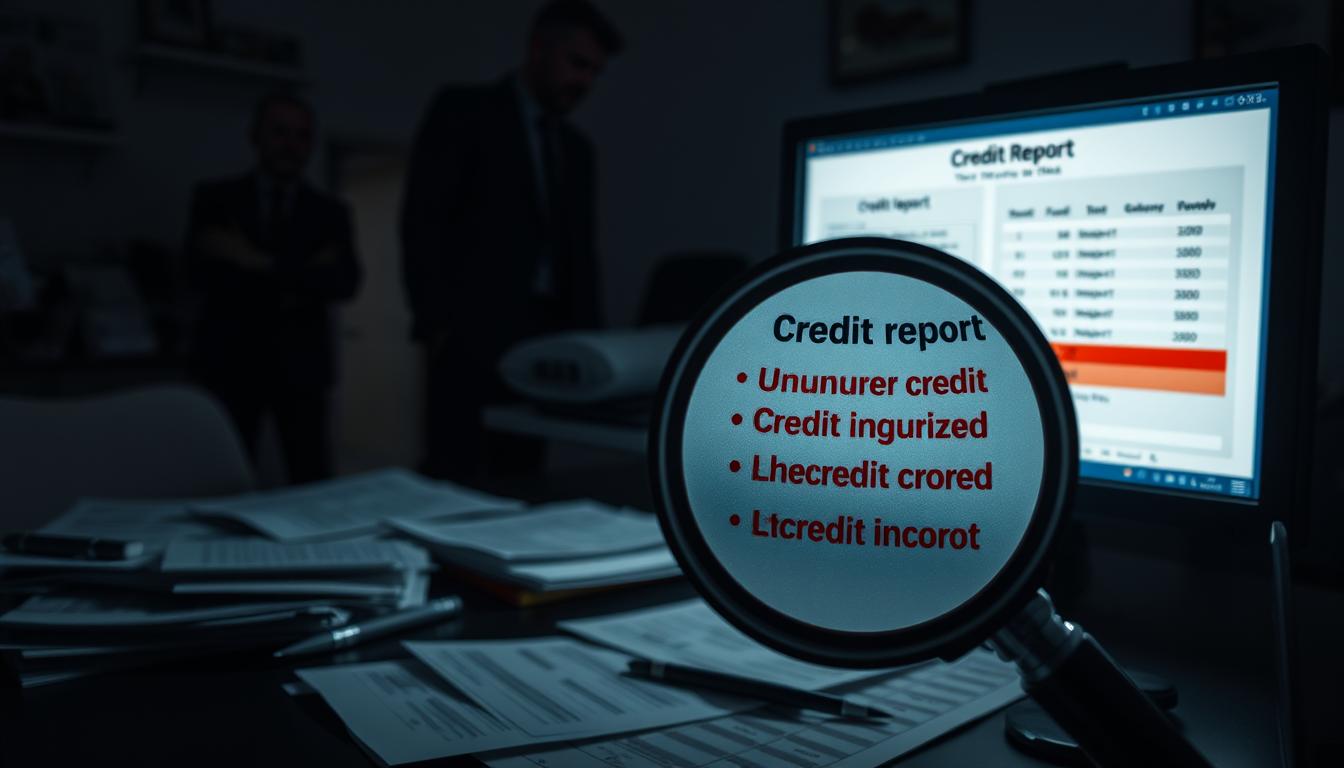Protecting your credit profile is crucial in our digital world. Unauthorized credit inquiries can harm your credit score and financial health. The Fair Credit Reporting Act (FCRA) gives you legal tools to hold businesses accountable.
This law helps you dispute unlawful practices and seek compensation for unauthorized credit pulls. You can take action to protect your financial future and maintain a healthy credit score.
Key Takeaways
- Understand what constitutes an unauthorized credit inquiry and its impact on your credit score.
- Learn about your rights under the Fair Credit Reporting Act (FCRA) to dispute and seek compensation for unauthorized credit pulls.
- Discover the step-by-step process to gather evidence, initiate legal action, and claim damages for credit report inaccuracies.
- Explore strategies to prevent future unauthorized credit inquiries and protect your identity from misuse.
- Leverage the assistance of consumer protection agencies and credit bureaus to address credit report errors.
Understanding Unauthorized Credit Inquiries
A good credit score is vital for many aspects of life. It affects loan terms, renting, and job prospects. Unauthorized credit inquiries can harm your score. These occur when someone checks your credit without permission.
Knowing about these inquiries is crucial for your financial health. It helps you protect your credit score. Understanding their impact allows you to take action if needed.
What Constitutes an Unauthorized Credit Inquiry?
An unauthorized credit inquiry is a “hard pull” on your credit report. It happens without your knowledge or consent. Identity thieves, creditor mistakes, or marketing purposes can cause these inquiries.
Legitimate credit checks are “soft pulls”. These don’t affect your credit score. “Hard pulls” from unauthorized inquiries can negatively impact your score.
The Impact of Unauthorized Credit Pulls on Your Credit Score
Unauthorized inquiries can lower your credit score by a few points. Multiple hard pulls suggest increased credit risk. They may indicate you’re applying for several loans quickly.
The impact is usually temporary. These inquiries typically disappear from your report after a year. However, they can cause significant hassle and potential damage.
Regular credit report monitoring is essential. Dispute any suspicious activity you find. This helps protect your credit and financial well-being.

“Unauthorized credit inquiries can be a major headache for consumers, but knowing your rights and taking action can help protect your credit and financial well-being.”
The Fair Credit Reporting Act and Your Rights
The Fair Credit Reporting Act (FCRA) protects your credit reporting rights. It empowers you to challenge unauthorized credit inquiries that can harm your credit score.
The FCRA requires credit agencies to keep accurate reports. You can dispute unauthorized inquiries with credit bureaus. This helps protect your credit profile from illegitimate activities.
Credit agencies must investigate disputes promptly. If an inquiry is unauthorized, they must remove it. This safeguards your consumer rights protection.
The fair credit reporting act is a powerful tool against credit report disputes. It holds credit reporting agencies accountable. Understanding your FCRA rights helps maintain your credit profile’s integrity.
The FCRA empowers consumers like you. Monitor your credit reports regularly. Assert your rights when facing unauthorized inquiries. This protects your financial well-being.
Take control of your credit report. Stay vigilant and use the FCRA to your advantage. Your financial future depends on it.
sue for unauthorized credit inquiry
You have the right to take action if you’re a victim of an unauthorized credit inquiry. To sue successfully, you’ll need strong evidence and documentation to support your case.
Gathering Evidence and Documentation
Get a copy of your credit report from Experian, Equifax, and TransUnion. Check these reports for any unauthorized credit inquiries. Identify the unauthorized inquiry and collect the following:
- A copy of your credit report showing the unauthorized inquiry
- Any correspondence or communication you’ve had with the credit reporting agencies or the company that made the unauthorized inquiry
- Records of any attempts to dispute the unauthorized inquiry with the credit reporting agencies
- Proof of identity, such as a driver’s license or passport
Initiating the Legal Process
Once you have the evidence, you can start the legal process. This usually involves these steps:
- File a formal dispute with the credit reporting agencies, disputing the unauthorized inquiry and requesting its removal from your credit report.
- If the credit reporting agencies fail to remove the unauthorized inquiry, you can file a lawsuit under the Fair Credit Reporting Act (FCRA).
- Consult with a consumer rights protection attorney who specializes in credit report disputes and unauthorized credit inquiries. They can guide you through the legal process and help you build a strong case.
- Prepare to provide the court with the evidence and documentation you’ve gathered, demonstrating the impact of the unauthorized credit inquiry on your credit score and overall financial well-being.
Act quickly to protect your rights. Gather solid evidence and work with a skilled lawyer. This will boost your chances of a successful lawsuit for unauthorized credit inquiry.

Credit Damage Claims and Potential Compensation
Unauthorized credit inquiries can harm your credit score and finances. You might be eligible for compensation if you’re a victim. Understanding claim types and possible compensation is key to financial recovery.
Calculating Damages from Unauthorized Credit Inquiries
Your compensation depends on your case details and the extent of financial harm. The credit score impact and other losses will be considered.
Common damages you can claim include:
- Decreased credit score: Unauthorized inquiries can lower your score. This may lead to higher loan interest rates and employment difficulties. You can calculate the monetary impact of this drop.
- Increased borrowing costs: A lower credit score often means higher interest rates. You can claim the difference in interest payments as damages.
- Time and expenses: Include the time spent disputing inquiries and any out-of-pocket costs in your claim.
Gather detailed documentation to support your compensation claim. Credit reports, loan applications, and financial statements can show the extent of damage.
| Type of Damage | Potential Compensation |
|---|---|
| Decreased credit score | Monetary impact of credit score drop |
| Increased borrowing costs | Difference in interest payments |
| Time and expenses | Cost of dispute process and out-of-pocket expenses |
Knowing potential compensation helps you take steps toward financial recovery. Seek justice and repair the damage caused by unauthorized credit inquiries.

Disputing Unauthorized Credit Inquiries with Credit Reporting Agencies
Safeguarding your credit report is vital in our digital world. Spotting unauthorized inquiries? Act fast. Credit agencies must maintain accurate information about you.
The Fair Credit Reporting Act empowers you to dispute errors. You can have them removed from your report. Here’s how to dispute unauthorized credit inquiries:
- Obtain a copy of your credit report from each of the three major credit bureaus. Carefully review the report for any unfamiliar or unauthorized credit inquiries.
- Gather all relevant documentation, such as any correspondence from the creditor or lender responsible for the unauthorized inquiry, as well as any evidence that demonstrates the inquiry was made without your consent.
- Compose a detailed letter to the credit reporting agency (or agencies) explaining the unauthorized nature of the credit inquiry. Be sure to include your full name, address, and a copy of your driver’s license or other form of identification.
- Submit your dispute and supporting documentation to the credit reporting agency via certified mail, return receipt requested. This will ensure that your dispute is properly recorded and processed.
- Monitor your credit report closely in the weeks and months following your dispute. The credit reporting agency is required to investigate your claim within 30 days and provide you with the results of their investigation.
Disputing credit report disputes with credit reporting agencies protects your consumer rights protection. It ensures your credit information stays accurate. These steps safeguard your finances and prevent credit bureau errors from hurting your score.

“Vigilantly monitoring your credit report and promptly addressing any unauthorized inquiries is essential in today’s credit-driven world.”
Preventing Future Unauthorized Credit Pulls
Protecting yourself from unauthorized credit inquiries is vital for your financial health. Taking proactive steps can lower identity theft risks. You can also maintain the integrity of your credit report.
Identity Theft Protection Measures
Prevent unauthorized credit pulls by using strong identity theft protection strategies. Monitor your credit reports regularly. Set up fraud alerts and consider a credit freeze.
These actions limit access to your credit information. They make it harder for thieves to open new accounts in your name.
- Enroll in a credit monitoring service to receive alerts about any suspicious activity on your credit reports.
- Place a fraud alert with the major credit bureaus to make it harder for identity thieves to open new accounts in your name.
- Consider a credit freeze, which restricts access to your credit report, effectively preventing unauthorized credit inquiries.
Monitoring Your Credit Reports Regularly
Review your credit reports often to spot unauthorized credit inquiries. Stay alert to quickly identify and dispute any issues. This protects your consumer rights and ensures effective credit report monitoring.
- Obtain your free annual credit reports from each of the three major credit bureaus (Equifax, Experian, and TransUnion).
- Carefully scrutinize your credit reports for any unfamiliar unauthorized credit pulls or identity theft indicators.
- Dispute any inaccuracies or unauthorized activity with the credit bureaus to ensure the integrity of your credit profile.
These proactive steps can help reduce future unauthorized credit pulls. They also protect your financial well-being. Stay vigilant to keep your credit secure.
Working with Consumer Protection Agencies
Unauthorized credit inquiries can be tackled with help from consumer protection agencies. These organizations protect your rights and ensure credit reporting agencies follow the Fair Credit Reporting Act (FCRA).
The Federal Trade Commission (FTC) and Consumer Financial Protection Bureau (CFPB) are key agencies for credit report issues. They can investigate problems and take action against noncompliant agencies.
Partnering with the FTC or CFPB offers several benefits. You can file complaints about unauthorized inquiries and get guidance on your FCRA rights.
These agencies can help resolve credit report disputes and inform you about legal options. Their resources and expertise are valuable in addressing unauthorized inquiries and maintaining an accurate credit report.
| Agency | Focus | Contact Information |
|---|---|---|
| Federal Trade Commission (FTC) | Enforcing consumer protection laws, including the FCRA | Phone: 1-877-FTC-HELP (382-4357) Website: www.ftc.gov |
| Consumer Financial Protection Bureau (CFPB) | Protecting consumers in the financial sector, including credit reporting issues | Phone: 1-855-411-2372 Website: www.consumerfinance.gov |
Your consumer rights are crucial. Working with these agencies can effectively address unauthorized credit inquiries and protect your financial health.
The Role of Credit Bureaus in Unauthorized Credit Inquiries
Credit bureaus are crucial in handling unauthorized credit inquiries. They guard consumer credit information and ensure report accuracy. Sometimes, errors lead to unlawful credit pulls, harming credit scores and financial health.
Addressing Credit Bureau Errors and Inaccuracies
Consumers can dispute errors in their credit reports, including unauthorized inquiries. The Fair Credit Reporting Act (FCRA) provides a framework for challenging these errors. By following the dispute process, individuals can remove unlawful credit pulls from their reports.
Here’s how to address credit bureau errors:
- Obtain a copy of your credit report from each of the three major credit reporting agencies (Experian, Equifax, and TransUnion).
- Carefully review your credit reports for any unauthorized credit inquiries or other inaccuracies.
- Prepare a detailed dispute letter outlining the specific errors or unauthorized activities, accompanied by supporting documentation.
- Submit the dispute letter and documentation to the relevant credit bureau(s).
- Monitor the status of your dispute and follow up if necessary to ensure the issue is resolved in a timely manner.
Taking action against credit bureau errors protects your credit profile. It helps maintain your financial well-being and safeguards your consumer rights.
| Credit Bureau | Contact Information | Dispute Process |
|---|---|---|
| Experian | Phone: 1-888-397-3742 Online: www.experian.com/disputes | Consumers can dispute errors online, by mail, or by phone. |
| Equifax | Phone: 1-800-685-1111 Online: www.equifax.com/personal/credit-report-services | Consumers can dispute errors online, by mail, or by phone. |
| TransUnion | Phone: 1-800-916-8800 Online: www.transunion.com/credit-disputes | Consumers can dispute errors online, by mail, or by phone. |
Knowing credit bureaus’ role and how to fix errors empowers you. You can actively protect your credit profile and secure your financial future.
Conclusion
This article has shown you how to sue for unauthorized credit inquiries. You can protect your credit score and seek compensation for credit damage claims. Your consumer rights protection is guaranteed, empowering you to fight unlawful practices.
The Fair Credit Reporting Act ensures responsible handling of your credit information. You have the right to challenge any unauthorized credit inquiries affecting your financial standing. Understanding your rights helps you control your credit history and seek justice.
This guide has given you tools to navigate the legal system effectively. You can now protect your financial well-being and hold wrongdoers accountable. Your credit and financial future deserve your best efforts.

